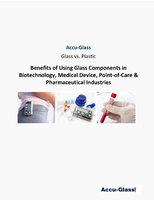Intercept Stretch Film Provides Unmatched Protection Against Corrosion
It's a frequent topic in business news coverage: The weak greenback is helping to spur U.S. exports and shrink the red ink in the country's trade balance. For Keith W. Donaldson, the growth in manufactured exports is winning new fame for his company's novel stretch-wrap film.
Corrosion Intercept Stretch Film provides unmatched protection against corrosion to any and all metal products--and lots of non-metal items as well, such as painted surfaces and synthetic fabrics. The film's anti-corrosion shield affords not only a very long-term defense, but also "green" benefits. Corrosion Intercept is the only anti-corrosion packaging material honored by the German government with an environmental award for being fully recyclable.
"There's nothing else quite like Corrosion Intercept Stretch Film," says Mr. Donaldson, President of Engineered Materials Inc. (EMI) in Buffalo Grove, Ill. "It doesn't use the volatile chemicals found in some rival materials, so there's no out-gassing and no risk of contaminating a packaged product."
EMI's film lives up to its name by intercepting corrosive agents before they can do damage. "Some people don't realize that water isn't the main threat. Instead," Mr. Donaldson explains, "it's usually the pollution we're dumping into the air. Gases containing sulfur or chlorine are two really bad actors, and so are ozone and nitrous oxides."
These airborne pollutants are especially troublesome in close proximity to cities and industrial plants, where smog and pollution levels can be high. Distance, though, is no guarantee of safety. Pollution from China's coal-burning electricity generators regularly blows across the Pacific Ocean, into the U.S. and Canada. And air pollutants released in the U.S. often turn up in Europe.
For users of EMI's film, proximity is not a worry. "Regardless of how polluted the air is, Intercept Stretch Film will effectively block corrosion--even from reactive gases that get wrapped inside the package," declares Mr. Donaldson.
The film acts like a magnet for potentially corrosive particles. Those inside the package, in the air or on the product's surface, are drawn irresistibly to the Intercept film. When chemically active atoms or molecules land on the film, they are quickly and permanently neutralized, ending their corrosion hazard.
Corrosion Intercept Stretch Film is made from polyethylene blended with a small amount of conductive copper and a proprietary "sauce." The final result is a covalently bonded, homogeneous stretch film with all ingredients permanently locked into the polymer matrix. The film thus complies with Germany's tough restrictions on materials entering the normal polyethylene recycle stream.
Intercept Technology was originally developed by Bell Labs, the renowned scientific powerhouse that helped enrich the world with such innovations as the transistor, fiber-optic systems, satellite communications, cellular telephony, and computer switchboards. The use of Corrosion Intercept packaging soon spread throughout the telecommunications industry and beyond. (Bell Labs became part of Alcatel-Lucent with the 2006 merger of Lucent Technologies Inc. and Alcatel of France.)
Engineered Materials Inc. now holds the exclusive worldwide license to this patented technology. EMI heads a global team that produces Intercept Stretch Film primarily for manufacturers of automotive parts, aerospace components, industrial machinery and tooling, and electronic parts. The film is also used by museums to protect artwork during long-term storage. Corrosion Intercept Stretch Film normally comes in 18-inch-wide, 2200-foot-long rolls of 1.5-mil thick polyethylene.




